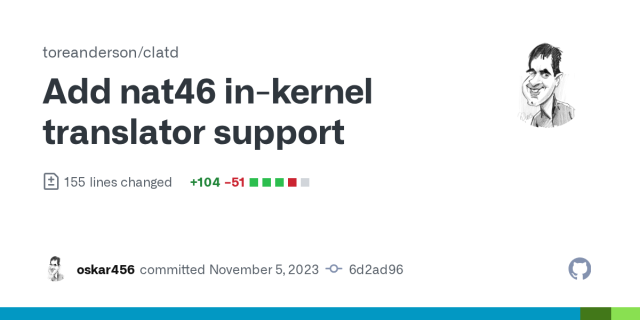My effort during IETF 118 hackathon got merged. Now you can use clatd by @tore not only with TAYGA user-space translator but also with nat46 kernel-space translator: github.com/toreanderson/clatd/…
We are still far from the universal availability of CLAT on Linux, but at least we started to move.

Add nat46 in-kernel translator support · toreanderson/clatd@6d2ad96
This allows clatd to use [nat46](https://github.com/ayourtch/nat46) kernel translator instead of TAYGA. It uses automatic detection - if `nat46` module is loaded, it will get used, otherwise the ap...GitHub
Tore Anderson
in reply to Ondřej Caletka • • •Thank you very much for your contribution, @Oskar456 ! 👌
It would have been much better if the functionality of clatd was included in the standard network management components like NetworkManager and systemd-networkd (honestly clatd is meant mostly as a proof of concept), but I doubt that will happen before there's a decent SIIT/NAT46 translation engine included in the upstream kernel.
Ondřej Caletka
in reply to Tore Anderson • • •definitely, that's the ultimate goal. But it still needs to be figured out what is going to do the actual packet translation.
During the hackathon, I also received a tip on how to make the clat least intrusive to the host OS - that means no forwarding enabled and no fiddling with firewall.
I have made a PoC and it seems to work quite well:
gist.github.com/oskar456/d898b…
I would like to try to write a daemon to automate such a setup and eventually integrate to NM and similar.
CLAT for Linux using Jool and ipvlan PoC
GistLitchralee_v6
in reply to Ondřej Caletka • • •Very nice! I've done something similar for a #k8s cluster that needed #NAT64 translation for its containers. One thing I did have to add was filtering within the namespace, since Jool was unexpectedly translating RFC1918 addresses when using the well-known prefix.
It was unclear to me why Jool was doing that, but all was easily fixed with some reject rules for each of the rfc1918 address subnets.
Thomas Schäfer
in reply to Litchralee_v6 • • •If I remember correctly android clat translates rfc1918 addresses too.(with the well known prefix)
Litchralee_v6
in reply to Thomas Schäfer • • •@tschaefer What I had in mind was the restriction from RFC6053 section 3.1, where the well known prefix is supposed to reject non-global legacy IP addresses.
I suppose it's not a big issue if Android's CLAT tries to initiate traffic with such a destination, but the #NAT64 gateway is supposed to decline to translate that destination within the well known prefix, if I understand the RFC correctly.
Ondřej Caletka
in reply to Litchralee_v6 • • •Litchralee_v6
in reply to Ondřej Caletka • • •Litchralee_v6
in reply to Litchralee_v6 • • •Ondřej Caletka
in reply to Litchralee_v6 • • •@litchralee_v6 @tschaefer I think the reason for that restriction is mostly the idea of the uniqueness of IPv6 addresses - the same reason why site-local addresses were deprecated. Basically it is considered beneficial that there is no case where one IPv6 address represents more than one node.
On the other hand, we have cases like NAT64 tethering on macOS which uses the same ULA prefix on every single host.
Ondřej Caletka
Unknown parent • • •@alexhaydock I am pretty sure it is too complex to be done completely in the kernel space.
Even OpenBSD requires some user space daemon to set this up, see codeberg.org/fobser/gelatod by @florian
The way this works with OpenBSD routing domains is basically the same solution using Linux network namespaces and Jool.
gelatod
Codeberg.orgAlex
Unknown parent • • •Tore Anderson
in reply to Ondřej Caletka • • •@alexhaydock @florian
What's missing in (vanilla) Linux is an in-kernel SIIT-EAM translation engine. (There are a couple of third party solutions but I doubt the systemd-networkd and NetworkManager developers are interested in supporting those until they are included upstream.)
NAT64 prefix discovery, CLAT interface provisioning and so on probably belongs in user space (prefix discovery should ideally be in a shared library that systemd-networkd and NetworkManager could both use).